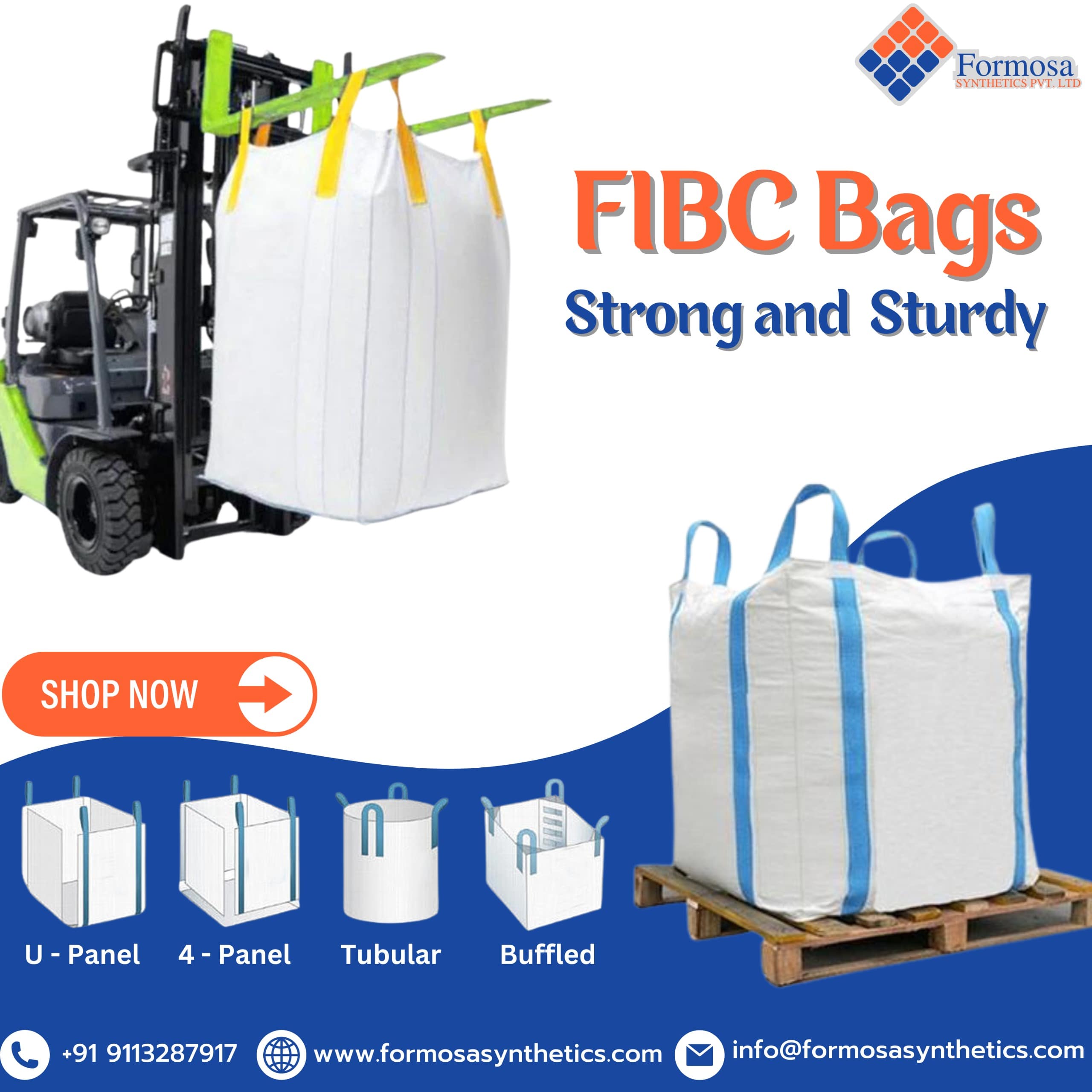Description
In today’s fast-paced market, safeguarding your products during transportation is paramount. That’s where PP Jumbo Bags, also known as FIBC bags, step in as a reliable solution. These bags have quickly become the go-to choice for bulk material shipping, offering both comfort and profitability. Manufactured by trusted jumbo bag manufacturers, PP Jumbo Bags are synonymous with high quality and durability.
FIBCs boast an exceptional package-to-product weight ratio, typically designed to handle five to seven pounds per metric ton.
However, integrating FIBCs into your transport business requires careful consideration. These bags must meet rigorous standards for stability and toughness, necessitating meticulous handling and storage practices.
Weather conditions pose a significant threat to the stability of bulk bags over time. Storms, downpours, and snow can gradually compromise their integrity. Proper storage is essential to maintain the quality of PP Jumbo Bags, ensuring they are shielded from indoor humidity and UV rays. Even though FIBCs are lightweight and flexible, their materials are susceptible to degradation if not stored correctly.
Furthermore, there is currently limited data on the expected shelf life of FIBCs, underscoring the importance of adhering to manufacturer recommendations and conducting regular stability tests. By prioritizing proper handling and storage procedures, you can maximize the longevity and effectiveness of PP Jumbo Bags, safeguarding your products throughout the transportation process.
How to Keep Properly Loaded Bulk Bags: Ensuring Safe Transport
When it comes to transporting goods, especially in bulk, ensuring their safety is paramount. Properly loaded bulk bags, also known as PP Jumbo Bags, play a crucial role in safeguarding your products throughout the transportation process.
Understanding Proper Loading Techniques
Before delving into the specifics of proper loading, let’s first understand the importance of it. Proper loading ensures that the weight is evenly distributed within the bulk bags, reducing the risk of tears, ruptures, or other damages during transit.
Key Steps for Properly Loading Bulk Bags
1. Choose the Right Bag:
Selecting the appropriate PP Jumbo Bag for your cargo is the first step. Ensure that the bag’s specifications, including size, weight capacity, and material, align with the requirements of your products.
2. Inspect for Defects:
Before loading, thoroughly inspect the bulk bags for any defects such as tears, punctures, or weak seams. Any compromised bags should be replaced immediately to avoid risks during transportation.
3. Evenly Distribute the Load:
When loading your products into the bulk bags, ensure that the weight is evenly distributed. Concentrating the weight in one area can strain the bag and lead to potential failures. Distribute the load as evenly as possible to maintain balance and stability.
4. Secure Closure:
Once loaded, securely close the bulk bags using the provided closure mechanisms, such as ties or zippers. Ensure that the closure is tight to prevent any spillage or leakage during transit.
5. Consideration of Environmental Factors:
Take into account the environmental conditions during transportation, such as temperature fluctuations, humidity, and exposure to elements. Depending on the nature of your products, additional precautions may be necessary to protect them from adverse conditions.
Benefits of Properly Loaded Bulk Bags
Ensuring that your bulk bags are properly loaded brings forth several benefits:
- Minimized Risk of Damage: Proper loading techniques reduce the risk of damage to your products during transportation, preserving their quality and integrity.
- Enhanced Safety: Well-loaded bulk bags contribute to safer transportation by mitigating the chances of accidents or spills.
- Cost-Efficiency: By preventing damages or losses, proper loading helps in avoiding additional costs associated with product replacement or repair.
What are the key factors to consider when integrating PP Jumbo Bags (FIBCs) ? Discover More
| Key Considerations | Description |
|---|---|
| Product Compatibility | Ensure that your products are compatible with PP Jumbo Bags in terms of characteristics, weight, size, and any special requirements. |
| Bag Design and Specifications | Select the appropriate bag design, size, weight capacity, lifting options, and closure mechanisms to meet your product and transportation needs. |
| Quality Assurance | Source PP Jumbo Bags from reputable manufacturers or suppliers to ensure high-quality, reliable performance, and compliance with industry standards. |
| Proper Loading and Handling | Follow best practices for filling the bags, ensuring even weight distribution, secure closure, and proper stacking to minimize the risk of damage. |
| Environmental Considerations | Take into account environmental factors such as temperature, humidity, and exposure to elements, and choose bags with appropriate features to mitigate risks. |
| Logistics Efficiency | Evaluate bag handling, storage space requirements, and compatibility with existing equipment or transportation methods to streamline operations and minimize costs. |
Maintenance and Care Tips for PP Jumbo Bags
PP Jumbo Bags, also known as FIBC bags, are invaluable assets in the transportation of bulk materials, offering durability, flexibility, and reliability. To ensure their continued effectiveness and prolong their lifespan, proper maintenance and care are essential. Here are some key tips to consider:
1. Regular Inspection:
Schedule regular inspections of your PP Jumbo Bags before and after each use. Look for any signs of wear and tear, such as tears, punctures, or frayed seams. Address any issues promptly to prevent further damage during transportation.
2. Cleaning:
Keep your PP Jumbo Bags clean and free from debris or residues between uses. After unloading materials, shake out any remaining particles and inspect the interior and exterior for cleanliness. If necessary, you can gently wash the bags with mild detergent and water, ensuring they are completely dry before reuse.
3. Storage:
Proper storage is crucial for maintaining the quality of PP Jumbo Bags. Store them in a clean, dry, and well-ventilated area away from direct sunlight and extreme temperatures. Avoid storing bags in areas prone to moisture or humidity, as this can lead to mold growth or degradation of the bag’s material.
4. Avoid Overloading:
Follow the manufacturer’s guidelines for maximum weight capacity and loading specifications. Overloading PP Jumbo Bags can strain the fabric and seams, increasing the risk of tears or ruptures during transportation. Distribute the load evenly to maintain balance and stability.
5. Handle with Care:
When handling PP Jumbo Bags, use proper lifting and handling equipment to minimize stress on the bag and its contents. Avoid dragging or dragging bags across rough surfaces, as this can cause abrasions or damage to the fabric.
By following these maintenance and care tips, you can prolong the lifespan of your PP Jumbo Bags and ensure their continued effectiveness in safeguarding your products during transportation. Prioritizing proper maintenance not only protects your investment but also contributes to safer and more efficient logistics operations.
Conclusion
PP Jumbo Bags, also known as FIBC bags, serve as indispensable guardians for products during transportation, offering a blend of durability, flexibility, and reliability. From their inception to their integration into transport businesses, meticulous care and attention are essential to maintain their effectiveness. Proper loading techniques, environmental considerations, and adherence to quality standards are paramount in safeguarding both the bags and the products they carry. Additionally, regular maintenance and care, including inspections, cleaning, and appropriate storage, play pivotal roles in prolonging the bags’ lifespan and ensuring continued protection during transit. By prioritizing these measures, businesses can not only preserve their investments but also contribute to safer, more efficient logistics operations, ultimately bolstering their competitiveness in today’s fast-paced market.
FAQs
What are PP Jumbo Bags
PP Jumbo Bags, also known as FIBC bags, are large, flexible containers designed for transporting bulk materials. They are typically made from polypropylene (PP) and are known for their durability and flexibility.
Why is proper loading important for PP Jumbo Bags?
Proper loading ensures that the weight is evenly distributed within the bulk bags, minimizing the risk of damage during transportation. It helps maintain balance and stability, reducing the likelihood of accidents or spills.
How do PP Jumbo Bags safeguard products during transportation?
PP Jumbo Bags provide a protective barrier for products during transportation by offering durability and stability. They help distribute the weight of the cargo evenly, reducing the risk of tears, ruptures, or other damages during transit.
What factors should be considered when integrating PP Jumbo Bags into transport businesses?
Key considerations include product compatibility, bag design and specifications, quality assurance, proper loading and handling techniques, environmental considerations, and logistics efficiency.




